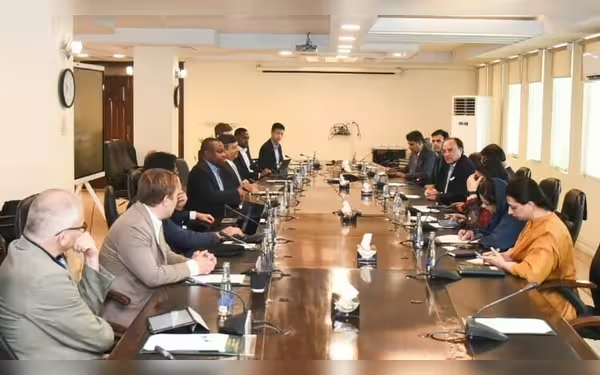Saturday, November 16, 2024 03:20 PM
Aurangzeb Discusses Investment Opportunities with J.P. Morgan in Pakistan
- Aurangzeb meets J.P. Morgan delegation for investment talks.
- Focus on renewable energy and infrastructure development.
- Government committed to enhancing foreign investment climate.
 Image Credits: brecorder
Image Credits: brecorderAurangzeb engages with J.P. Morgan to explore investment opportunities, emphasizing Pakistan's potential and government support for foreign investors.
In a significant move to attract foreign investment, Federal Minister for Finance and Revenue Muhammad Aurangzeb recently met with a delegation of international investors, led by Amin Mohammad Khowaja, the CEO of J.P. Morgan Pakistan. This meeting, held on Wednesday, focused on exploring fixed-income investment opportunities within Pakistan’s growing economy. The discussions highlighted the increasing interest of institutional investors in various sectors, showcasing Pakistan as a land of immense potential.
According to a statement from the Finance Division, the talks covered a wide array of investment areas, including renewable energy, information technology, infrastructure development, and the financial sector. The investors expressed a strong desire to tap into these sectors, recognizing Pakistan's strategic location as a gateway to regional markets. This interest is particularly encouraging, as it indicates that foreign investors are eager to explore opportunities that could lead to mutual benefits.
During the meeting, Minister Aurangzeb assured the delegation of the government’s unwavering support in facilitating their investment ventures. He emphasized the importance of foreign investment in contributing to Pakistan’s economic growth. The Finance Minister also shared positive developments on the economic front, such as a 14% increase in exports, a decline in the Consumer Price Index (CPI) inflation to 9.6% in August 2024, and an overall reduction in the Current Account deficit. These indicators reflect a stabilizing economy, which is crucial for attracting foreign capital.
Furthermore, Aurangzeb pointed out the improvement in Pakistan’s sovereign credit ratings, which signify a stable and promising economic outlook. He stated, “The country’s economic growth is underpinned by robust fiscal discipline, inflation management, and a favorable balance of payments.” This statement underscores the government's commitment to maintaining a healthy economic environment that is conducive to investment.
In addition to discussing current economic conditions, Aurangzeb elaborated on the government’s structural reforms agenda. This agenda aims to broaden the tax base, rightsizing the public sector, initiating a privatization drive, and implementing energy sector reforms. These measures are designed to enhance overall macroeconomic stability and create a more favorable environment for foreign investment.
As the meeting concluded, Aurangzeb reaffirmed the government’s resolve to carry forward its comprehensive reforms agenda, which is essential for improving the efficiency and governance of public institutions. He noted, “These reforms are designed to create a more conducive environment for foreign investment and to ensure the long-term stability of the economy.” This commitment is vital for building investor confidence and fostering a sustainable economic landscape.
In summary, the engagement between Aurangzeb and the J.P. Morgan delegation marks a pivotal step towards enhancing Pakistan’s investment climate. The government’s proactive approach in addressing economic challenges and promoting structural reforms is likely to yield positive results. As foreign investors continue to show interest in Pakistan, it is crucial for the government to maintain its momentum in creating a business-friendly environment. This not only benefits the economy but also paves the way for a brighter future for the people of Pakistan.













